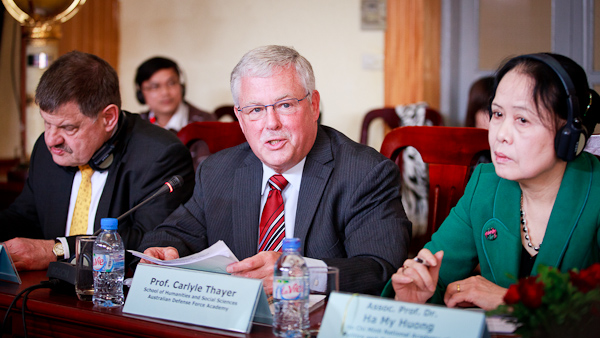On December 10, 2010, the University of Social Sciences and Humanities in collaboration with the Rosa Luxemburg Foundation (Germany) successfully organized the International Conference "The role of Vietnam in the Asia-Pacific region".The workshop was attended by leading Vietnamese and international scholars from the Party Central Committee's Foreign Affairs Commission, the Diplomatic Academy (Ministry of Foreign Affairs), the Institute for Strategic Studies (Ministry of Public Security), the Institute of International Relations, the Department of Foreign Affairs (Ministry of National Defense), the Communist Magazine, the Institute for World Economics and Politics, the Institute of Southeast Asian Studies, the Institute of African and Middle Eastern Studies, the Institute of Chinese Studies, the Faculty of History (Hanoi National University of Education 1), and representatives of the Faculties of the University of Social Sciences and Humanities. In particular, the workshop also had the presence of Prof. Carlyle Thayer from the Australian Defense Academy and Dr. Gerhrard Will from the Institute of Science and Political Studies (Germany). A total of 15 reports were presented at the workshop. On behalf of the school's leadership, Vice Principal Assoc. Prof. Dr. Nguyen Van Kim thanked the Rosa Luxemburg Foundation for its close cooperation with the school in implementing many research and training projects with high efficiency and quality. Vice Rector Nguyen Van Kim also highly appreciated the initiative of the Faculty of International Studies and the Rosa Luxemburg Foundation in organizing this Conference in the last days of 2010, when Vietnam assumed the ASEAN chairmanship and the regional situation was undergoing complex developments with a new security architecture gradually taking shape. On behalf of the Rosa Luxemburg Foundation, Ms. Dorit Lehrack also expressed her satisfaction with the good cooperation between the two sides and affirmed that she would continue to support future projects.

During the presentation and discussion, the delegates had a very lively exchange on the following main contents. Firstly, Asia-Pacific is a region with a particularly important geopolitical and geo-economic position, with a mixture of traditional and non-traditional security challenges and is also a place where the strategic interests of the world's largest powers such as the United States, China, Japan, and Russia compete. Secondly, scholars also believe that at present as well as in the coming years, the security of the Asia-Pacific region will be influenced and shaped mainly by the struggle between the great powers, mainly between the superpower United States on one side and China, a rising country on the other. Thirdly, the Asia-Pacific region is gradually forming a new security architecture with the increasingly active participation of small and medium-sized countries, typically the ASEAN countries, with their central and steering roles. Fourth, in such a complex context, the question is to accurately, objectively and scientifically assess Vietnam's position and strength. With that spirit, the Workshop frankly and enthusiastically discussed Vietnam's role from historical, political, economic, security, cultural and diplomatic perspectives.

Although there is no final conclusion, scholars all agree that this is a topic of great importance and as a leading research and training center in social sciences and humanities of the country, the University should continue to maintain and strive to organize such seminars annually to share information, enhance understanding and provide scientific arguments to contribute to solving problems that the country and society are concerned about.


